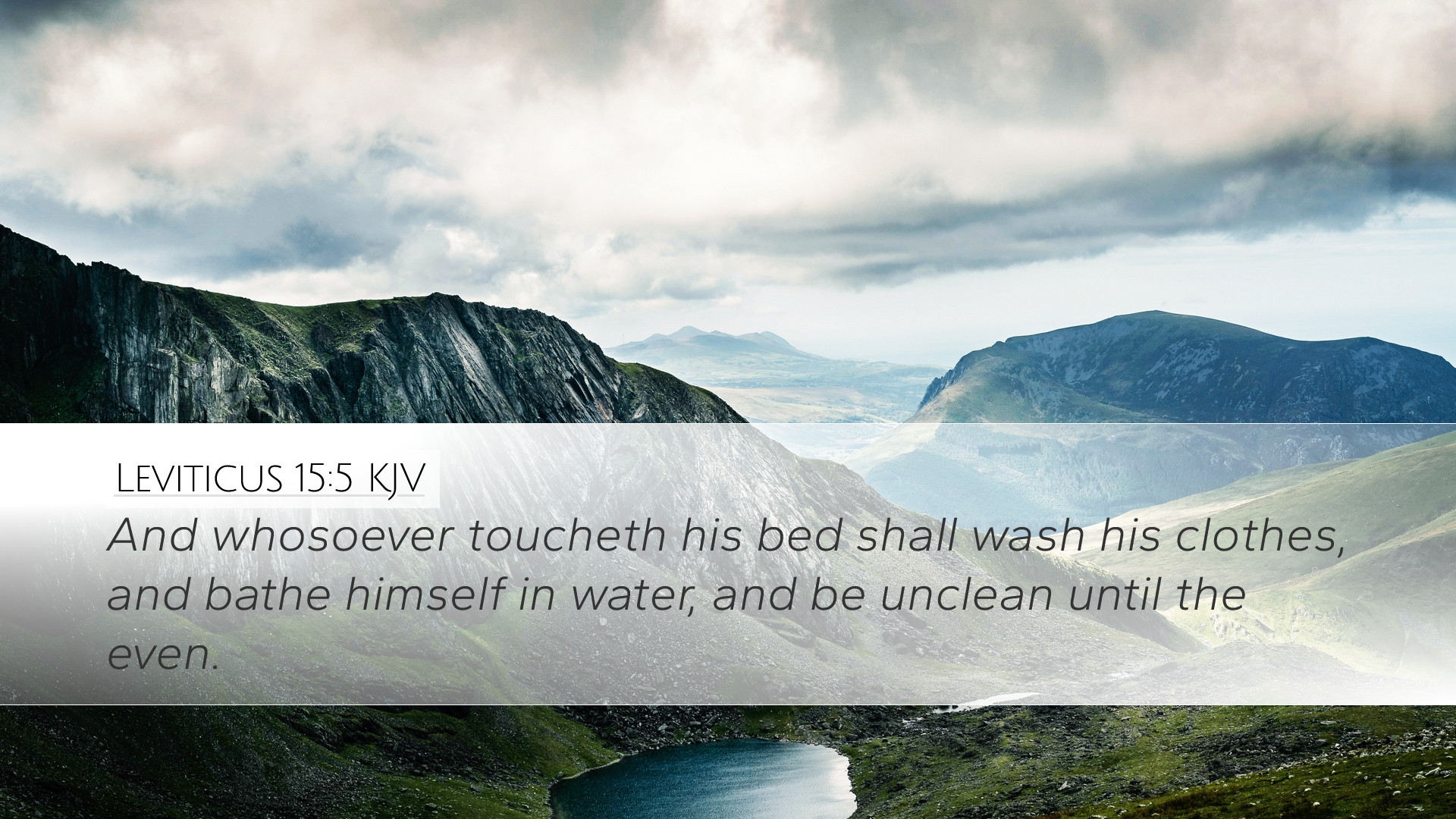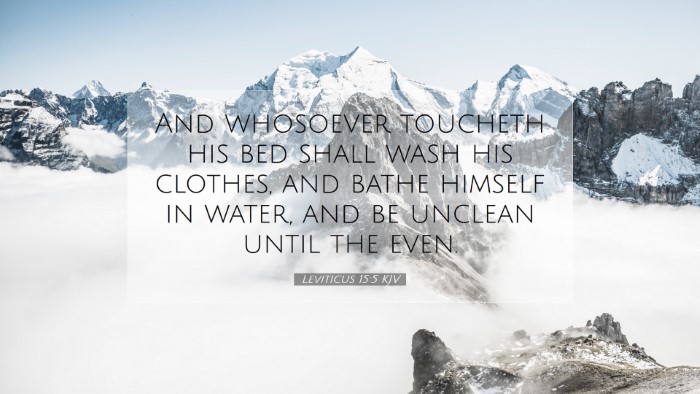Commentary on Leviticus 15:5
Leviticus 15:5 states: "And whoever touches his bed shall wash his clothes and bathe in water, and be unclean until evening." This command concerning ceremonial cleanliness is pivotal in the context of ancient Israelite law and ritual purity.
Contextual Overview
This passage is situated within the broader context of the laws concerning bodily discharges, which are introduced in Leviticus 15. Understanding these laws requires a keen appreciation of the holiness code of Israel. The Israelites were called to maintain a distinctive holiness, separating them from the practices of surrounding nations.
Significance of Cleanliness
In Leviticus, the emphasis on cleanliness reflects not just physical hygiene, but also spiritual and communal aspects of faith. Matthew Henry explains that the laws surrounding bodily discharges were designed to teach the people about the seriousness of sin and the need for purification.
Matthew Henry's Perspective: He underscores that cleanliness was often seen as a prerequisite for approaching God. This verse serves as a guideline for communal living where individuals must consider how their own state of cleanliness impacts the community.
Cultural Implications of Touch
Touching an unclean person or object rendered one ceremonially unclean, illustrating the contagious nature of impurity in the ancient Israelite context. Albert Barnes notes that this principle of touch reflects the broader theological concept of sin—it spreads, infecting others in proximity.
- Impurity Affects Many: This reinforces the idea that personal holiness is vital for communal harmony.
- Need for Rituals: The washing of clothes and bathing symbolize a restoration process, emphasizing the importance of rituals in returning to a state of purity.
Ritual Bathing and Implications for Worship
According to Adam Clarke, the process prescribed for washing and bathing presents a vivid picture of the disciplined approach to holiness required of the people. During worship, maintaining ceremonial cleanliness was essential as a means of showing reverence to God.
This bathing signifies not only the physical act of cleansing but also the spiritual cleansing that each Israelite was called to pursue consistently. Clarke asserts that this physical act points to a deeper spiritual truth: believers must continuously seek to cleanse their hearts and minds in devotion to God.
The Principle of Separation
The overarching principle found in Leviticus 15:5 is that of separation—both in the physical sense and the spiritual sense. The rituals serve to distance the people from that which is unclean, symbolizing a broader moral and ethical separation from sin. Henry succinctly states that the idea of separation underscores God’s unwavering command for His people to be holy.
Theological Reflections
From a theological perspective, this verse echoes the gospel's message of purification and the believer's journey toward holiness. Just as the Israelites needed to be cleansed before approaching God, so Christians are called to seek purity through Christ as the ultimate sacrificial lamb.
- Connection to New Testament: This principle can be likened to Christian teachings in 1 John 1:9, where confession and purification are vital for maintaining fellowship with God.
- Symbolism of Water: The act of bathing captures the new birth and regeneration theme found in Christian theology, as believers are washed clean in the waters of baptism.
Practical Applications for Today
For pastors, students, and theologians, Leviticus 15:5 emphasizes the importance of personal and communal holiness. The teachings from this verse can be applied in various contexts:
- Community Living: Understanding how individual actions affect the church body can foster a greater sense of accountability and encouragement toward collective holiness.
- Personal Purity: Engaging in regular self-examination and repentance is crucial for spiritual growth and maturity.
- Rituals of Cleansing: Incorporating practices such as baptism and confession can serve as vital reminders of our need for continual cleansing before God.
Conclusion
In summary, Leviticus 15:5 provides rich insights into the nature of purity, community, and the holiness that God demands from His people. By reflecting on the insights of Matthew Henry, Albert Barnes, and Adam Clarke, modern readers can glean valuable lessons about the importance of maintaining personal and communal purity in their spiritual lives. The call to be set apart continues to resonate and challenge believers today, urging them toward deeper sanctification and a more profound relationship with the Divine.


